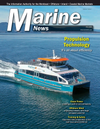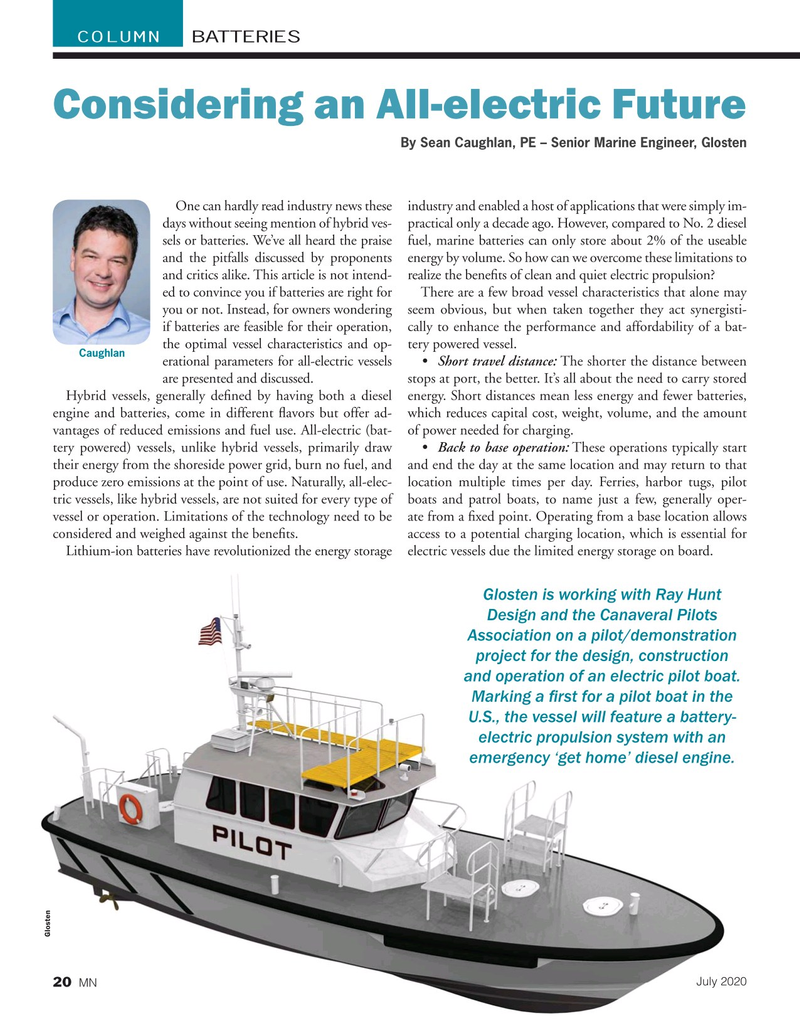
Page 20: of Marine News Magazine (July 2020)
Propulsion Technology
Read this page in Pdf, Flash or Html5 edition of July 2020 Marine News Magazine
COLUMN BATTERIES
Considering an All-electric Future
By Sean Caughlan, PE – Senior Marine Engineer, Glosten
One can hardly read industry news these industry and enabled a host of applications that were simply im- days without seeing mention of hybrid ves- practical only a decade ago. However, compared to No. 2 diesel sels or batteries. We’ve all heard the praise fuel, marine batteries can only store about 2% of the useable and the pitfalls discussed by proponents energy by volume. So how can we overcome these limitations to and critics alike. This article is not intend- realize the bene?ts of clean and quiet electric propulsion?
ed to convince you if batteries are right for There are a few broad vessel characteristics that alone may you or not. Instead, for owners wondering seem obvious, but when taken together they act synergisti- if batteries are feasible for their operation, cally to enhance the performance and affordability of a bat- the optimal vessel characteristics and op- tery powered vessel.
Caughlan erational parameters for all-electric vessels UÊ-??ÀÌÊÌÀ>ÛiÊ`?ÃÌ>?Vi\ÊThe shorter the distance between are presented and discussed. stops at port, the better. It’s all about the need to carry stored
Hybrid vessels, generally de?ned by having both a diesel energy. Short distances mean less energy and fewer batteries, engine and batteries, come in different ?avors but offer ad- which reduces capital cost, weight, volume, and the amount vantages of reduced emissions and fuel use. All-electric (bat- of power needed for charging. tery powered) vessels, unlike hybrid vessels, primarily draw UÊ >V?ÊÌ?ÊL>ÃiÊ?«iÀ>Ì???\ These operations typically start their energy from the shoreside power grid, burn no fuel, and and end the day at the same location and may return to that produce zero emissions at the point of use. Naturally, all-elec- location multiple times per day. Ferries, harbor tugs, pilot tric vessels, like hybrid vessels, are not suited for every type of boats and patrol boats, to name just a few, generally oper- vessel or operation. Limitations of the technology need to be ate from a ?xed point. Operating from a base location allows considered and weighed against the bene?ts. access to a potential charging location, which is essential for
Lithium-ion batteries have revolutionized the energy storage electric vessels due the limited energy storage on board.
Glosten is working with Ray Hunt
Design and the Canaveral Pilots
Association on a pilot/demonstration project for the design, construction and operation of an electric pilot boat. 0DUNLQJDÀUVWIRUDSLORWERDWLQWKH
U.S., the vessel will feature a battery- electric propulsion system with an emergency ‘get home’ diesel engine.
Glosten
July 2020 20 MN

 19
19

 21
21
